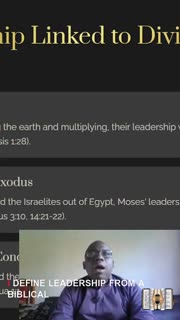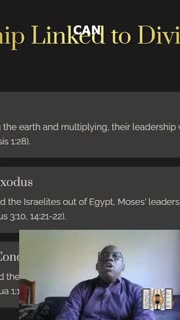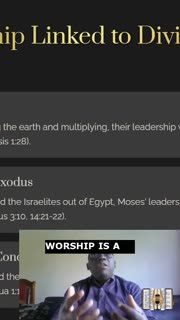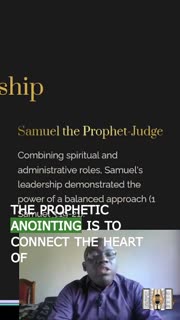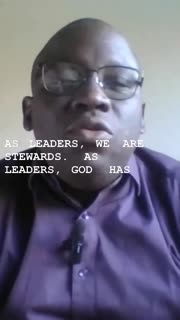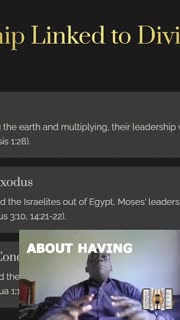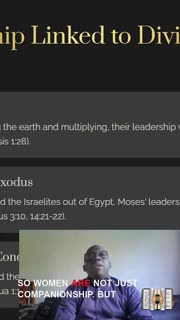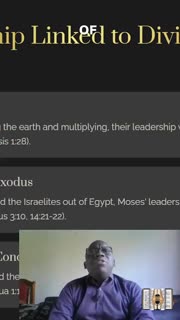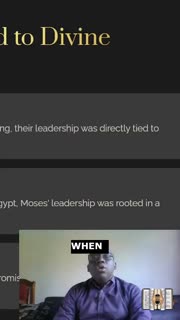Divine Leadership: Stewardship and Servanthood in Christ
Devotional
Sermon Summary
Bible Study Guide
Sermon Clips
### Quotes for Outreach
1. "Leadership is a kind of a shepherd style. Where God called you, God assigned you to take care of a group of people that he put under your care or he put... over us. You have oversight over them. To lead them to him. To lead them to him. Lead them into his purposes. Lead them into his plan. Lead them into the instructions and the values that he have laid in scripture." [04:06] (27 seconds)
2. "I define leadership from a biblical perspective as stewardship. Where God gives you something. Gives you a task or a mission or assignment. And wants you to fulfill that. Wants you to accomplish that. And when we see that in the context of Adam and Eve. They were tasked. When you see that in Genesis chapter 1 verse 28. We recall the kingdom mandate. You know? The mandate of dominion that God has given them." [06:04] (27 seconds)
3. "God can bless you with so many skills, he can bless you with so many abilities, he can bless you with so many talents, so many anointing if you call it or whatever. But without his presence with you every day, you will not make it. And let me tell you, whatever success you think you have achieved in life, in everything that you're doing, whatever success you think you have achieved, if God is not involved, it's not a success." [12:52] (22 seconds)
4. "Worship is a way, it's through worship that we invite God, we bring God into our journey, we bring God into everything that we do. And that's one of the purposes of worship. Yes, we worship God because of who he is, but through worship we bring the presence of God in our life and it's through that presence that God guides us in everything." [13:52] (22 seconds)
5. "The prophetic anointing is to connect the heart of men to the heart of God. He has a way of revealing God that is unique because it's only through the prophetic anointing that we will connect with God and we will be able to connect with God and we will be able to connect. We have a relation for God. The more you know about God, the more you can relate with him." [25:30] (15 seconds)
### Quotes for Members
1. "As leaders, we are stewards. As leaders, God has given us a responsibility to walk according to the model that he showed us. And be an example to all that we're going to follow in our full step. So, leadership. It's key. And throughout the Bible, you see, it's all about leaders. People that God called, appointed, anointed, in power, and in part, he's anointed and he's put it into to be able to lead others in the purposes and the plan that he has for them." [02:58] (29 seconds)
2. "Dominion is not about having control over it. Dominion is having power to fulfill. You know? What God has given. God gives you power over something. It's not about you having control over it. Being above it. But it's you having that power. To fulfill it. To work out the ground. Or work out the people. Work out whatever assignment he's giving you. Work out to a place where it's reserved. Or it comes exactly to what God wanted it to be." [06:44] (31 seconds)
3. "So women are not just companionship. But they're there to help men in fulfilling what God has given to them. So they were as a team. And God gave them that mandate to what? To multiply. To subdue the earth. Subdue in the way we work the earth. You know? Fashion the earth. Make it in the way that I expect of you. Okay? And now that they go. As they receive the mandate. Not just the mandate. They receive the blessing. They receive the empowerment. They receive the breath of God. The mandate. And the blessings of God." [07:16] (35 seconds)
4. "The particularity of that leadership is that God doesn't just give them instruction and give them a mission or give them something to do. But God himself is with them. Okay? It's not just yes Adam and Eve as a team. But in that team also you have God. They cannot do it without him. And that's our problem as human. And we've come to that. And that's where we fail in as leaders in a way." [08:41] (21 seconds)
5. "So when it was time for them to leave then God choose someone else. God decided to choose someone again. Are you with me? God chose Moses and Moses mission was to lead the people of Israel out of Egypt out of slavery out of boundary out of out of bondage out of the influence and the oppression of pharaoh and take them to the promised land and the promised land is a land that God prepared God set up for the people of Israel so his work was to do that." [21:12] (32 seconds)
Ask a question about this sermon
1. "Leadership is a kind of a shepherd style. Where God called you, God assigned you to take care of a group of people that he put under your care or he put... over us. You have oversight over them. To lead them to him. To lead them to him. Lead them into his purposes. Lead them into his plan. Lead them into the instructions and the values that he have laid in scripture." [04:06] (27 seconds)
2. "I define leadership from a biblical perspective as stewardship. Where God gives you something. Gives you a task or a mission or assignment. And wants you to fulfill that. Wants you to accomplish that. And when we see that in the context of Adam and Eve. They were tasked. When you see that in Genesis chapter 1 verse 28. We recall the kingdom mandate. You know? The mandate of dominion that God has given them." [06:04] (27 seconds)
3. "God can bless you with so many skills, he can bless you with so many abilities, he can bless you with so many talents, so many anointing if you call it or whatever. But without his presence with you every day, you will not make it. And let me tell you, whatever success you think you have achieved in life, in everything that you're doing, whatever success you think you have achieved, if God is not involved, it's not a success." [12:52] (22 seconds)
4. "Worship is a way, it's through worship that we invite God, we bring God into our journey, we bring God into everything that we do. And that's one of the purposes of worship. Yes, we worship God because of who he is, but through worship we bring the presence of God in our life and it's through that presence that God guides us in everything." [13:52] (22 seconds)
5. "The prophetic anointing is to connect the heart of men to the heart of God. He has a way of revealing God that is unique because it's only through the prophetic anointing that we will connect with God and we will be able to connect with God and we will be able to connect. We have a relation for God. The more you know about God, the more you can relate with him." [25:30] (15 seconds)
### Quotes for Members
1. "As leaders, we are stewards. As leaders, God has given us a responsibility to walk according to the model that he showed us. And be an example to all that we're going to follow in our full step. So, leadership. It's key. And throughout the Bible, you see, it's all about leaders. People that God called, appointed, anointed, in power, and in part, he's anointed and he's put it into to be able to lead others in the purposes and the plan that he has for them." [02:58] (29 seconds)
2. "Dominion is not about having control over it. Dominion is having power to fulfill. You know? What God has given. God gives you power over something. It's not about you having control over it. Being above it. But it's you having that power. To fulfill it. To work out the ground. Or work out the people. Work out whatever assignment he's giving you. Work out to a place where it's reserved. Or it comes exactly to what God wanted it to be." [06:44] (31 seconds)
3. "So women are not just companionship. But they're there to help men in fulfilling what God has given to them. So they were as a team. And God gave them that mandate to what? To multiply. To subdue the earth. Subdue in the way we work the earth. You know? Fashion the earth. Make it in the way that I expect of you. Okay? And now that they go. As they receive the mandate. Not just the mandate. They receive the blessing. They receive the empowerment. They receive the breath of God. The mandate. And the blessings of God." [07:16] (35 seconds)
4. "The particularity of that leadership is that God doesn't just give them instruction and give them a mission or give them something to do. But God himself is with them. Okay? It's not just yes Adam and Eve as a team. But in that team also you have God. They cannot do it without him. And that's our problem as human. And we've come to that. And that's where we fail in as leaders in a way." [08:41] (21 seconds)
5. "So when it was time for them to leave then God choose someone else. God decided to choose someone again. Are you with me? God chose Moses and Moses mission was to lead the people of Israel out of Egypt out of slavery out of boundary out of out of bondage out of the influence and the oppression of pharaoh and take them to the promised land and the promised land is a land that God prepared God set up for the people of Israel so his work was to do that." [21:12] (32 seconds)

